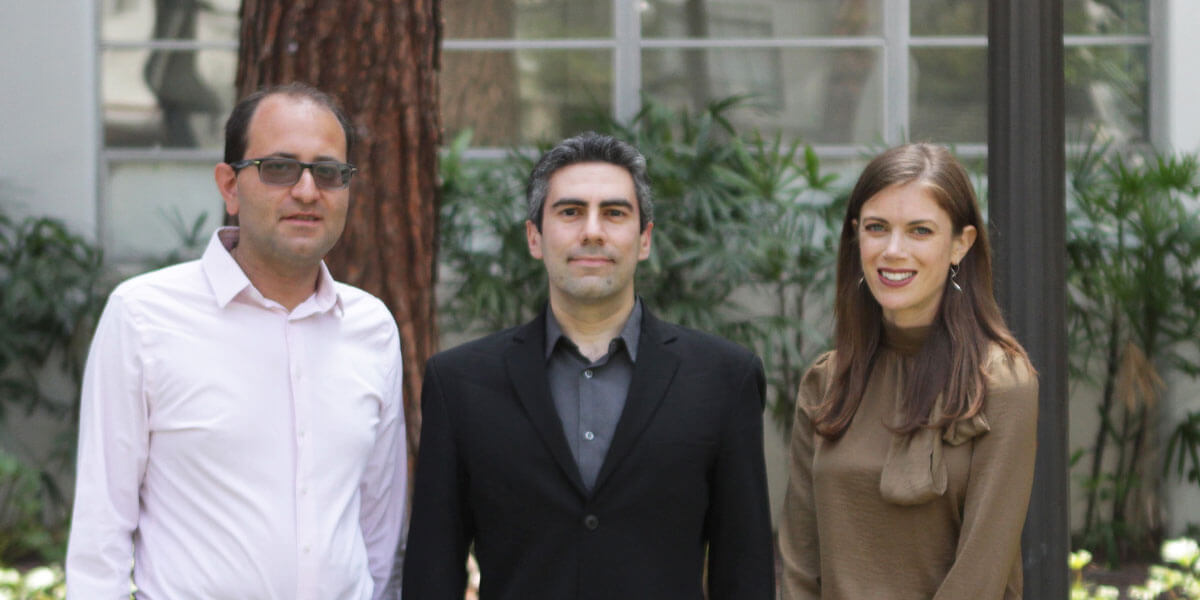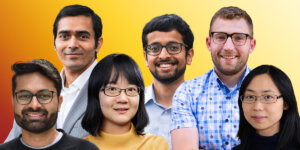
(Left to Right) Mahdi Soltanolkotabi, Pierluigi Nuzzo, and Kelly Sanders recently received highly competitive NSF CAREER Awards (Photo/Michelle Henry)
Kelly Sanders, an assistant professor in the Sonny Astani Department of Civil and Environmental Engineering, and Pierluigi Nuzzo and Mahdi Soltanolkotabi, assistant professors in the Ming Hsieh Department of Electrical and Computer Engineering, have received the prestigious National Science Foundation Early CAREER Award.
The honor goes to early-career faculty members who combine teaching with research, showing promising potential for excellence and leadership in their respective fields.
Kelly Sanders
Sanders’ research focuses on the relationship between two critical human resources: energy and water. “It takes a lot of energy to move, treat and heat water, and it takes a lot of water for energy production, processing, and conversion,” said Sanders, the Dr. Teh Fu Yen Early Career Chair. “I use system-scale models to quantify the relationships between these interdependent resources and anticipate how future trends such as climate change might impact their dependencies in the future.”
Sanders has authored over two dozen publications; has been recognized in Forbes’ “30 Under 30: Today’s Disruptors and Tomorrow’s Brightest Stars;” and was selected to MIT Technology Review’s “35 Innovators Under 35” for her contributions.
With her NSF grant of $500,000, Sanders wants to create a framework of how to improve the performance of the power grid by considering how resources will affect and be affected by climate change. She hopes to help guide smart policy decisions and efficient energy and water infrastructure and technology.
“It is truly remarkable and most deserving that the National Science Foundation has recognized Kelly’s cutting-edge research and all her efforts,” said Lucio Soibelman, chair of the Sonny Astani Department of Civil and Environmental Engineering.
“Not only is [Kelly] working hard to solve some of society’s most pressing problems, she is also providing the highest quality education to our students and serving as a mentor to the next generation of engineers,” he added. “Her use of the grant will help train a new generation of interdisciplinary engineers to address some of the most complex environmental challenges of our time.”
Sanders began her work as an assistant professor at USC after earning her Ph.D. in environmental engineering from the University of Texas at Austin.
“I wanted to teach in California because the state has large tensions between its energy and water management,” she said. “The majority of the water in the state originates in the northern part of the state, while the majority of the demand is in the southern part of the state. Thus, we use a lot of energy to pump water from north to south.”
Pierluigi Nuzzo
Nuzzo is recognized for his work in developing tools and methodologies for improving the design of cyber-physical systems. These are systems that utilize physical components and software components simultaneously, and, even if you haven’t heard the term before, they have an immense amount of influence on modern society.
“Cyber-physical systems are an integral part of our lives,” said Nuzzo. “Examples range from autonomous cars’ networks, aircraft and robots, to energy-efficient buildings, computer-monitored and controlled factory lines, and wearable medical devices.” Of course, as with many new fields, the pace at which the new technology has grown often surpasses our ability to efficiently and securely implement it – especially when it comes to systems that support autonomous vehicles, less-than-perfectly-built systems can have disastrous consequences.
As these next-generation systems rely more and more on AI and machine-learning, Nuzzo will use his NSF CAREER grant to develop new theories, algorithms and tools to build better systems. Instead of analyzing or testing machine-learning and AI components in isolation, Nuzzo aims to investigate efficient methods to analyze and control the impact of their behavior on the overall system in real-world operation environments.
The depth at which cyber-physical systems already affect society is what makes his work so important, and Nuzzo is acutely aware of his responsibility. These systems are changing the way entire industries operate and are radically influencing how we deal with crucial societal problems, such as national security and safety, civil infrastructure, transportation, and healthcare. That means when one of these systems isn’t reliable, major threats to individuals and society quickly emerge. “Humankind has always designed new artifacts which further shape the world around us and augment our capabilities,” Nuzzo said. “It is, however, on us to ensure that these artifacts operate safely and enhance our lives responsibly.”
Mahdi Soltanolkotabi
“Mahdi is a world leader in developing the computational algorithms that underpin the ongoing revolution in artificial intelligence and machine vision,” said Richard Leahy, department chair of the Ming Hsieh Department of Electrical Engineering-Systems and Dean’s Professor of Electrical Engineering and Professor of Electrical and Computer Engineering, Biomedical Engineering, and Radiology. “Winning the NSF Career Award is a welcome recognition of the importance of this work.”
Soltanolkotabi’s research focuses on designing and analyzing reliable nonconvex learning algorithms to tackle challenging problems in making a variety of technologies, from MRIs to microscopes to self-driving cars, more efficient and reliable by drawing conclusions from data via algorithms. Nonconvex learning algorithms are more complex and difficult to formulate than convex learning algorithms, because they deal with less predictable data points.
“Many of the most commonly used learning algorithms in science and technology still lack a clear mathematical foundation and are poorly understood,” said Soltanolkotabi, an Andrew and Erna Viterbi Early Career Chair. “As a result, assessing the validity of insights derived from these algorithms is a difficult and error-prone process, which has in turn lead to many research findings that are false or difficult to replicate.”
For this reason, Soltanolkotabi works to develop the mathematical backgrounds of these complex algorithms to better understand and interpret results and data.
With his $550,000 grant, Soltanolkotabi plans to investigate the basic foundations of nonconvex optimization algorithms. He will focus on algorithms in a variety of areas, from modern artificial intelligence to nano-scale imaging. His work with imaging and AI technologies has widespread applications and impacts in health, security, climate science and commerce.
Soltanolkotabi also plans to motivate underrepresented minorities in STEM through outreach activities that will get them involved in research.
Soltanolkotabi received his B.S. in electrical engineering from Sharif University of Technology in Tehran, Iran, in 2009, before going on to earn his master’s degree and Ph.D. in electrical engineering from Stanford University. He spent a year as a postdoc at UC Berkeley before coming to USC as an assistant professor in 2015.
“I was drawn to USC for its collegial environment and excellence in interdisciplinary research opportunities,” Soltanolkotabi said. “And the cultural diversity and LA weather were a plus.”
Soltanolkotabi has been deeply interested in both mathematics and the applications of engineering since adolescence. “As a kid, I broke a few devices and circuits trying to reverse engineer how they work,” Soltanolkotabi recalled. “I was quite intrigued by how mathematical thinking can lead to dramatic improvements in engineering. This motivated me early on to build up both my math and engineering skills and pursue research at this interface.”
“This award was the culmination of a lot of research and work during the past three years at USC. It feels so great for this work to be acknowledged,” Soltanolkotabi said.
Added Tony Levi, the electrophysics chair of the Ming Hsieh Department of Electrical and Computer Engineering: “As anyone who has worked with Mahdi already knows, he is an individual driven by intellectual curiosity – often seeking mathematically rigorous solutions to problems while simultaneously understanding and adapting to the necessarily pragmatic nature of many applications. The fact that he is the recipient of a 2019 NSF Career Award is recognition of both his talent and future potential.”
Published on June 24th, 2019
Last updated on September 16th, 2020









